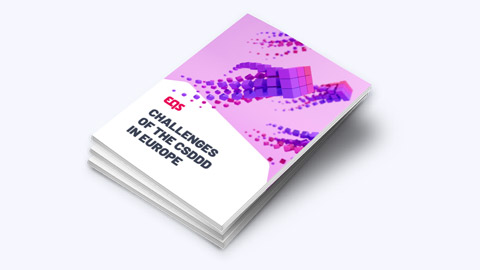AI & IR: The Rise of Artificial Intelligence in Investor Relations
How AI can be used to impact and potentially improve investment decisions and what this means for IR teams

Digitalisation has made its mark on IR and is here to stay. Digital communication channels have become an integral part of the IROs world. From emails and the distribution of announcements to financial events taking place “virtually” with the use of webcasting and web and video conferencing. The next digital frontier for IR is the use of artificial intelligence (AI).
The rise in new digitalisation developments translates into both opportunities and risks for businesses. IROs will have to understand these impacts to earn the trust of the investment community and to stay relevant.
What does artificial intelligence in investor relations mean?
Artificial intelligence refers to software-based systems that use data inputs to make decisions on their own. AI enables data to be processed at a far quicker rate and has an almost infinite number of applications across sectors.
For IR these applications could vary from data analytics on your company and analysis of shareholder voting behaviour to more effective investor targeting.
How artificial intelligence can be used to impact and potentially improve investment decisions
AI will change the investment landscape in three ways:
- Investors will be forced to place more value on the quality of a company’s AI assets.
- Investors themselves will rely far more on AI-based research techniques to support their investment approach.
- Investors will compete head-to-head with the technology sector for AI talent.
The days when the company and its investors had access to all of the same information will soon be long gone. Many investors are spending their budget on information sources that rely on AI to improve the insights they have into their portfolio companies and competitive landscapes to improve their overall performance.
A couple of examples:
- At a portfolio company level, AI-driven software has the ability to analyse a conference call recording and script (for example a results call) and will identify issues with tone of voice and language used to identify any red flags for investors.
- From a competitive landscape perspective, let’s take the example of parcel delivery companies. Investors have been known to use satellite technology with AI-driven analysis to determine the activity levels of delivery companies in different cities based on the colour of the delivery vans.
These are just two examples, but the application of AI has no limits. As a result, information asymmetry during investor meetings is becoming increasingly common. IROs and executives need to be aware of this and prepare.
Taking AI and automation a step further, some funds are removing the human element to identifying investments altogether. In this particular instance, there would in fact be no-one for a company to engage with at all.
“Vanguard founder Jack Bogle recently went on the record to predict that 90% of equity markets trading would be driven by passive investment funds and exchange-traded funds in the future. Active fund managers are under intense pressure to justify themselves and their fees. Pensions and cash given to an AI programme, the argument goes, will do a better job at a fraction of the price. Robo-advice is here to stay.”
Industry view: AI can change everything in IR, IR Magazine (Feb 27, 2019)
What investor relation teams need to be aware of with artificial intelligence
The opportunities
The advances in AI could potentially open up many opportunities for IROs in terms of shaping their message to investors. Imagine shareholder identification reports being available in real-time. While not something that will be possible in the short term, there is no reason that couldn’t be a future proposition.
AI has the capacity to gain access to propriety sentiment, volatility and investor algorithms for all stocks. By using this data and analysis, IROs could be in a position to really understand the motivation behind investment decisions and therefore be able to better tailor messages to both existing and potential investors. Investor targeting will therefore become much more of a science based on data.
The risks
When we take the Vanguard example above, the number of active funds will continue to decrease as well as the management of some funds being completely automated. This poses a challenge for IR in terms of remaining relevant. That being said, active funds will continue to exist which means that relationship building and active communication with investors will continue to be an essential part of the IROs role.
IROs also need to be aware that AI can pose risks to the business more generally. They need to understand if and how AI is being used within their organisation and be in a position to answer questions during meetings. For example, if AI is being used, what is the ethical framework around the use of AI within your organisation? Do you have risk mitigation processes for AI ‘going wrong’?
Also, is your company prepared for the potential criminal use of AI, meaning that it could be used to attack the company. For example, AI could help hackers accelerate the process of gaining access to private company information. Boards using digital board portals, hybrid phones and conferencing equipment could be vulnerable if not adequately protected. This clearly also falls into cyber security, an increasingly important topic for investors.
These are just a few of the risks that IR need to be aware of. As investors increase their knowledge of AI, it’s opportunities and risks, IR teams will either need to be more knowledgeable in this area or be prepared to introduce experts in the company to their investor community.
The future of artificial intelligence and IR
Will AI takeover? A common fear about the future for all sectors. Our view is that AI and human IROs will continue to work happily alongside one another for as long as we can predict. IR is not just based on data. Trust and relationships are integral to an effective IR programme and this will continue to be the case. AI will however allow IROs to gain deeper insights into vast amounts of data much more quickly and effectively, thus allowing them to enhance their performance.
This is an ever-evolving space and IR-related tools will continue to be introduced to the market. We would recommend keeping an eye for the new tools that make the lives of IROs easier. Watch this space.

EQS IR COCKPIT is the world’s first platform which brings together and coordinates investor data, contact management, disclosure obligations and news distribution in one tool



